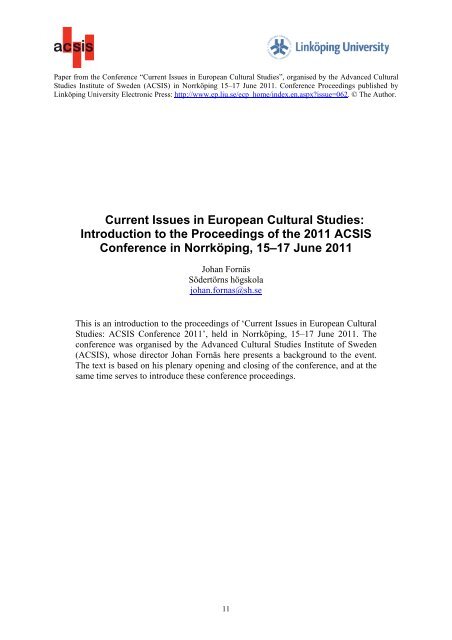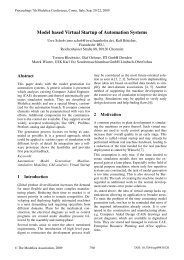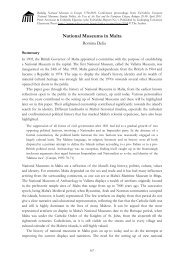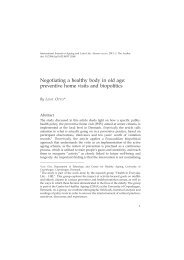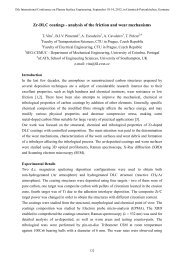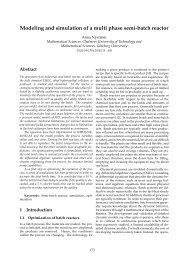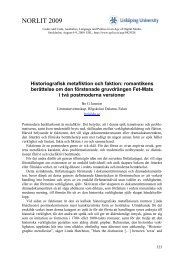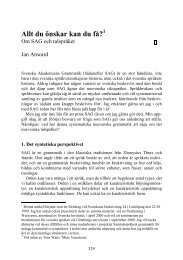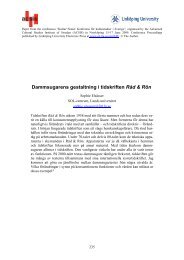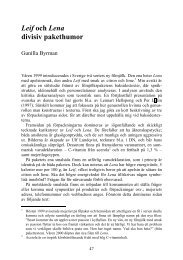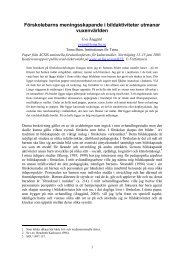Fulltext - Linköping University Electronic Press
Fulltext - Linköping University Electronic Press
Fulltext - Linköping University Electronic Press
You also want an ePaper? Increase the reach of your titles
YUMPU automatically turns print PDFs into web optimized ePapers that Google loves.
Paper from the Conference “Current Issues in European Cultural Studies”, organised by the Advanced Cultural<br />
Studies Institute of Sweden (ACSIS) in Norrköping 15–17 June 2011. Conference Proceedings published by<br />
<strong>Linköping</strong> <strong>University</strong> <strong>Electronic</strong> <strong>Press</strong>: http://www.ep.liu.se/ecp_home/index.en.aspx?issue=062. © The Author.<br />
Current Issues in European Cultural Studies:<br />
Introduction to the Proceedings of the 2011 ACSIS<br />
Conference in Norrköping, 15–17 June 2011<br />
Johan Fornäs<br />
Södertörns högskola<br />
johan.fornas@sh.se<br />
This is an introduction to the proceedings of ‘Current Issues in European Cultural<br />
Studies: ACSIS Conference 2011’, held in Norrköping, 15–17 June 2011. The<br />
conference was organised by the Advanced Cultural Studies Institute of Sweden<br />
(ACSIS), whose director Johan Fornäs here presents a background to the event.<br />
The text is based on his plenary opening and closing of the conference, and at the<br />
same time serves to introduce these conference proceedings.<br />
11
CURRENT ISSUES IN EUROPEAN CULTURAL STUDIES<br />
‘Current Issues in European Cultural Studies’ was the title of an international conference<br />
organised by the Advanced Cultural Studies Institute of Sweden (ACSIS) in Norrköping 15-<br />
17 June 2011. This gathering event for all kinds of contemporary cultural studies in Europe<br />
today defined cultural studies as widely as the Association for Cultural Studies (ACS) and its<br />
Crossroads conferences, encompassing not only the dominant Anglo-American branches of<br />
this transnational field but also all other thriving currents of critical and interdisciplinary cultural<br />
research that have since the 1980s transformed cultural studies from a particular school<br />
of thought to a polycentric, glocal and open-ended intellectual field.<br />
The conference focus was on the greater European area, in turn comprising a large number<br />
of local, national and regional subcurrents. All such geographical divisions and boundaries are<br />
always necessarily contestable, and one may well argue against how we have delimited the<br />
general scope of the conference as well as the regional areas covered by each of the five spotlight<br />
sessions. We all have shifting ways of grouping and organising our field, and it is<br />
instructive to also have a look at official definitions. For instance, the Council of Europe<br />
includes 47 member states, whereas the European Union only has 27 members. Colonial links<br />
also connects tiny areas in Africa and the Americas to the Eurozone, making borders even<br />
fuzzier.<br />
Also, the way Europe is subdivided into regions differs greatly. For instance, United<br />
Nations statistics subdivide Europe into four regions where Britain belongs to the North and<br />
Germany and France to the West, while those who acknowledge Central Europe as a fifth<br />
region usually include both Germany, Poland and Hungary there.<br />
We instead heuristically chosed to link the Netherlands to the German-speaking countries<br />
in the Central Europe spotlight session, restricted North Europe to the Nordic countries and<br />
West Europe to Britain, and kept the border between South (Mediterranean) and East (“New”)<br />
Europe deliberately open. There is no “correct” version, and we could just hope that the constellations<br />
we constructed would at least make it possible to in each session highlight certain<br />
patterns, and in the final plenary jointly discuss both commonalities and mutual differences<br />
between cultural studies branches in various parts of Europe. This hope was confirmed, as the<br />
spotlight sessions turned out to offer a fascinating overview over key trends in the field today.<br />
The plenaries and most of the group sessions had no such geographical boundaries.<br />
Instead, they dealt with ‘current issues’ in contemporary cultural research. Besides the final<br />
plenary summing up the region spotlights and pointing towards the future, we identified four<br />
such key topics. ‘Cosmopolitan issues’ dealt with place, community, glocalisation and citizenship.<br />
‘Cosmic issues’ scrutinised the increasingly precarious interplay between nature and<br />
culture. ‘Chronotopic issues’ focused on remembering, narrating and history. ‘Convergence<br />
issues’ combined materiality and representation in intermedial crossroads.<br />
ACSIS is since 2002 a national centre for interdisciplinary cultural research<br />
(www.acsis.liu.se). This is thus ACSIS’s tenth year of activity, and next spring we can celebrate<br />
the happy ending of our first decade. Our vision and goal was to establish a networking<br />
hub that would strengthen cultural research by crossing both geographical and topical borders,<br />
linking national universities with international currents and disciplinary with transdisciplinary<br />
discourses. We have managed to arrange this great series of successful conferences, a national<br />
mailing-list network, a stream of individual exchanges and visits, and installing a very<br />
important coordinating body in the form of our national board with one representative from<br />
each Swedish university, chaired by Professor Dan Brändström.<br />
12
Activities also since 2009 include an open access academic journal Culture Unbound:<br />
Journal of Current Cultural Research, published by <strong>Linköping</strong> <strong>University</strong> <strong>Electronic</strong> <strong>Press</strong><br />
(www.cultureunbound.ep.liu.se). This has become a praised resource, supplementing established<br />
print forums such as the European Journal of Cultural Studies, together offering useful<br />
publishing opportunities for European scholarship. We have also engaged in ongoing debates,<br />
for instance by publishing an anthology on Swedish cultural studies and an issue of the journal<br />
Kulturella Perspektiv, devoted to the tricky question of how to evaluate the usefulness of<br />
cultural research, which was also the focus of a conference in 2008.<br />
It is not easy for critical and interdisciplinary cultural research to gain acceptance and find<br />
space for expanding in these times of highly problematic changes in basic conditions for education<br />
in so many countries. How to balance justifiable demands for societal usefulness with<br />
equally crucial requirements of relative autonomy and critical creativity remains a difficult<br />
task. Under shifting labels, cultural studies has emerged as an increasingly open and inclusive<br />
alternative for humanities and social science scholarship, with a capacity to bridge basic critical<br />
research with imaginative interchange with non-academic spheres of society and a clear<br />
awareness of the urgent issues of today. In the various sessions of this conference, one could<br />
trace some of the most disputed frontlines of today’s cultural research in various parts of<br />
Europe, showing how both the drawing of boundaries and the transgression of them are mutually<br />
implicated in our intellectual practices.<br />
The conference was generously supported by the Bank of Sweden Tercentenary Foundation<br />
(Riksbankens Jubileumsfond), the WennerGren Foundations, <strong>Linköping</strong> <strong>University</strong>’s<br />
Faculty of Arts and Sciences and the City of Norrköping. Johanna Dahlin was conference<br />
organiser, assisted by Martin Fredriksson, and Svante Landgraf edited the program book. The<br />
ACSIS board and some European board members of the ACS supported at various moments<br />
of the process in which we initiated this event and laid down its key parameters. The invited<br />
plenary moderators and voluntary session organisers filled our basic ideas with fascinating<br />
contents in terms of the topics and speakers now presented in the programme, with more than<br />
50 individual sessions. A set of local young scholars generously assisted with technicalities in<br />
all sessions.<br />
In all, some 230 cultural studies scholars gathered in Norrköping for this event. The gender<br />
balance was even (54% women), and participants came from (at least) 27 countries, roughly<br />
half (51%) from Sweden and 42% from the rest of Europe. 8% (19 individuals) came from the<br />
UK, 6% (14) from the Netherlands, 4% each from Denmark (9) and Turkey (8), 3% (7) from<br />
the USA, and participants also from Australia, Austria, Belgium, Bosnia and Herzegovina,<br />
Canada, Croatia, Finland, France, Germany, Greece, Hungary, Italy, Japan, Mexico, Norway,<br />
Poland, Portugal, Romania, Slovenia, Spain and Switzerland. From Sweden, some 20 universities<br />
were present, among them Stockholm (11%), <strong>Linköping</strong> (10%), Lund (5%) and Södertörn<br />
(4%). As for institutional belonging, the many disciplines and interdisciplinary fields<br />
represented are even more difficult to categorise. In a falling scale, participants were affiliated<br />
with cultural studies, media studies, history, ethnology, literature, sociology, music, art, gender,<br />
education studies, geography, political science, anthropology, STS, ethnic studies, philosophy,<br />
archaeology, architecture, language, economy and religion.<br />
The Council of Europe and the European Union have together established five official<br />
symbols of Europe: a flag, an anthem, a day, a motto and a currency. (For a critical and interpretive<br />
study of these and a wealth of other identifying European symbols, see Johan Fornäs:<br />
Signifying Europe, Bristol: Intellect <strong>Press</strong> 2011.) These may well all be challenged and were<br />
also contested by scholars at this conference, who chose to define Europeanness in alternative<br />
or oppositional ways. However, it seems to me that at least the motto is relevant for us today<br />
too, as we are also ‘united in diversity’: finding these kinds of gatherings useful and inspiring<br />
not in spite of our mutual differences but precisely because of them. The field of cultural<br />
13
studies really derives its attraction by its ability to make us meet so many others who look<br />
differently on the burning issues we are facing today.<br />
These conference proceedings offer a glimpse of the polyphony orchestrated by the 2011<br />
‘Current Issues in European Cultural Studies’ conference. More echoes will be heard in future<br />
monographs, anthologies, journal articles and theme issues – and new research initiatives.<br />
14


